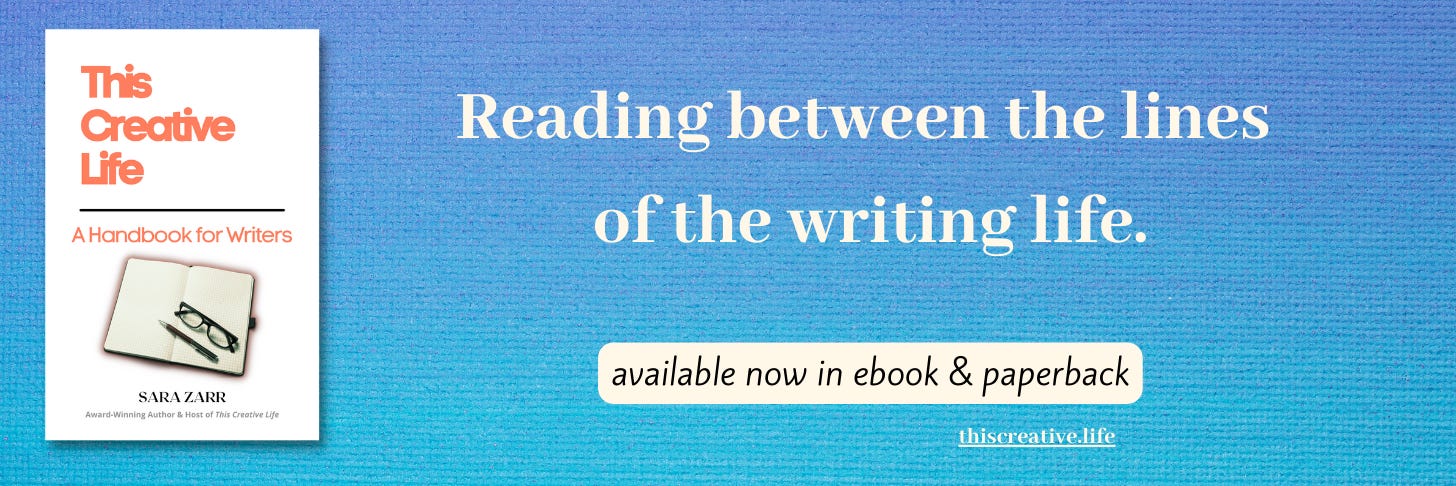I recently finished spending about nine days in residency with the MFA program I work for. I met the students I’ll be working with this semester, taught a couple of seminars, and ran student workshops. There were readings and talks and excitement for all the things we’ll be writing in the coming months.
In the background of that time were the ongoing January 6th hearings, daunting economic news, and the repeal of Roe v. Wade. And it feels like by the time I’m done writing this newsletter, there will be something else. It is an almost laughable understatement to repeat the mantra of the 2020s: it’s a lot.
I know I’m not the only one who finds my writing suffering for it. That can manifest different ways, from the struggle to focus an overloaded mind to the will to tear myself away from the news to mustering up even the desire to try.
I think that can be the hardest thing—figuring out if you even want to keep doing it. When it feels like the world is burning down, is writing something you want to save from the fire? Or are there more important things you’d rather take hold of with your limited strength and time?
It’s okay to wonder. There’s a reason that one of my most often-repeated pieces of writing advice is: it’s okay to not write.
But…if you’re a writer—if that’s your vocation, your avocation, part of your identity, or even simply a lifelong habit—it’s very likely that writing does belong in the go-bag, that it’s something that will help you survive and be strengthened or comforted through the worst of times.
It might be something you need to think of as self-care. A lot of writers start to feel “off” when we go too long without writing. We’re not totally ourselves. We get cranky or depressed. We feel unsettled. But like many forms of self-care, it can be easy to let slide.
Maybe the key to keeping the desire from being another casualty of all that’s afoot is to rethink what writing is to us and how we want to use it. Here are some ways to write and think about writing that might help you keep the practice alive, so that it continues to be there for you and you for it and it for the world.
Write to remind yourself why you write.
If you’re not sure, write a “why I write” manifesto or mission statement. Maybe you once knew, but the purpose has gotten hazy. Sometimes the reasons you started in the first place aren’t the same reasons that will keep you going through tumultuous times.
Write to help make a change or raise your voice. Use your skill with words to write letters to the editor, write your state reps, write your senator. Write your family members. Write your friends.
Write to figure out what you think. Maybe your mind gets overloaded, as mine does, with everyone else’s thoughts and the never-ending firehose of information. Maybe it would be good to get quiet and write through what you’re thinking and feeling. It helps me to deactivate my social media accounts sometimes to head off the temptation to fill my brain with more people’s fear, anxiety, anger, and legitimately rational worries before I’ve taken time to process my own.
Write to give yourself a break. We can’t process all of this difficult and upsetting information during all our waking hours and not pay a cost in mental health, which can also end up costing in physical health. Taking some time out to delve into your fantasy series or your romcom, your great American novel or your middle grade masterpiece, your screenplay or poem or song might be just what you need.
Or…let writing go. I know several people who I used to always see and hear from in the writing and publishing world who have decided, in the last five or six years, to set down their writing in order to get involved in local and state politics, campaigns for change, or nonprofits.
Maybe your “why I write” statement will turn into a “why I’m not writing right now,” and there is no shame in that.
🆓 FREE BOOKS! As part of my great self-publishing experiment, I joined a couple of summer promos with other self-pubbed writers to see if it would help me find new newsletter readers. The purpose of this is to build newsletters, which means if you want one of these free books you will probably have to agree to give your email address and you will end up on a newsletter. Which of course you can unsubscribe from at any time! Given that disclaimer, here is the link for some free books! This particular promo is for nonfiction, specifically. There are some other writing books, some self-help stuff, and even one about why you do not love your children. (? I don’t make the rules!)
👋 If you found this newsletter via one of those promos and got a free copy of This Creative Life, thank you, welcome, and hello! (Psst, yes you can get a free copy of This Creative Life through that link for a limited time.)
👩💻 Here’s a little interview I did about A Song Called Home and writing in general recently for Jason DeHart’s blog.
🎙️ Get this post in audio form through the This Creative Life podcast feed, wherever you get podcasts. All the links! (Or search your favorite app for “This Creative Life with Sara Zarr.”
This Creative Life is a book, a newsletter, and a podcast from me, Sara Zarr, about reading between the lines of a writing life. The newsletter and podcast are free; buying the book helps support them and me. You can also make one-time contributions if you like. Check out the options under Support at thiscreative.life or jump right to ko-fi. Sharing the newsletter is also a great way to keep it going!



